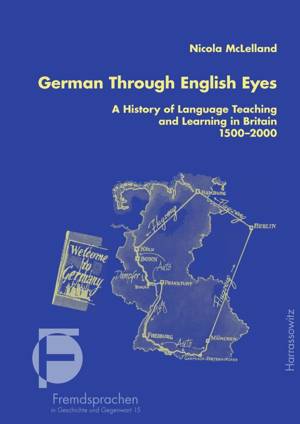
- Afhalen na 1 uur in een winkel met voorraad
- Gratis thuislevering in België vanaf € 30
- Ruim aanbod met 7 miljoen producten
- Afhalen na 1 uur in een winkel met voorraad
- Gratis thuislevering in België vanaf € 30
- Ruim aanbod met 7 miljoen producten
Zoeken
German Through English Eyes
A History of Language Teaching and Learning in Britain 1500-2000
Nicola McLelland
€ 184,95
+ 369 punten
Omschrijving
McLelland's pioneering study charts the history of foreign language learning and teaching in the UK over five centuries (1500-2000), taking German as her case study. From the first grammar of German for English speakers, published in 1680, McLelland traces the growth in interest in German for travel and trade, and its rapid increase in prestige in the eighteenth century as a language of literary merit, before German became established in schools and universities from the second quarter of the nineteenth century onwards. Taking hundreds of textbooks as her primary sources, as well as the pronouncements of teachers, examiners and policy-makers, McLelland considers the changing reasons for teaching and learning German, and the consequent changes in teaching methods (including the influence of the Reform Movement around 1900, innovations such as language laboratories, and, more recently, the communicative approach). She analyses changes in how the German language was presented, including advances in how the sound system and word order were described. Finally, and crucially, she considers how German culture and history have been represented to English-speaking learners, particularly over the past hundred years, a century of troubled Anglo-German cultural relations. A chronological bibliography of several hundred textbooks for the period 1600-2000 will serve as a stimulus for further research.
Specificaties
Betrokkenen
- Auteur(s):
- Uitgeverij:
Inhoud
- Aantal bladzijden:
- 444
- Taal:
- Engels
- Reeks:
- Reeksnummer:
- nr. 15
Eigenschappen
- Productcode (EAN):
- 9783447101486
- Verschijningsdatum:
- 31/10/2015
- Uitvoering:
- Hardcover
- Formaat:
- Genaaid
- Afmetingen:
- 175 mm x 244 mm
- Gewicht:
- 1020 g

Alleen bij Standaard Boekhandel
+ 369 punten op je klantenkaart van Standaard Boekhandel
Beoordelingen
We publiceren alleen reviews die voldoen aan de voorwaarden voor reviews. Bekijk onze voorwaarden voor reviews.







